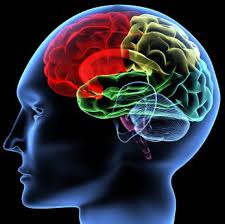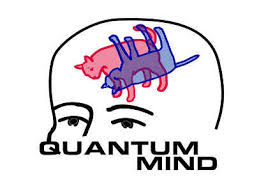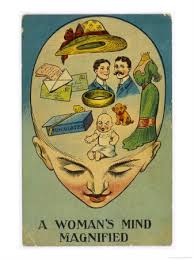| |
MULTITASKING....MAKES YOU INCOMPENTENT & USELESS....as Creator's design of mind/brain/consciousness/body is only for UNI-TASKING at greater than light
Posted by Vishva News Reporter on April 16, 2010 |
   
.....UNI-TASKING vs
MULTI-TASKING....
|
THIS IS another evergreen
CONTINUING OF
PVAF's SHARING OF
vED
Knowledge = sciences of life and creation
FROM ITS
vED
SCHOLAR
CONTRIBUTIONS since 1996....
scientific
facts of Today's news story
PROVEs the truth in
vED knowledge
THAT
.......HUMAN MIND-brain-consciousness-body
IS DESIGNED FOR only UNI-TASKING...
meaning
TO
DO ONLY ONE THING AT A TIME
BUT AT THE SPEED
EXCEEDING LIGHT SPEED to the INFINITE DEGREE.....
|
| (If YOU wish to discuss
and/or expand on the reference to vEDik
KNOWLEDGE referred above... the contributor of the entire
write-up of today's news story
Champaklal Dajibhai Mistry has
kindly agreed to be contacted by YOU...please click
here
for this contact via email......) |
Stanford
University SCIENTIFIC study
in August 24, 2009 issue of
the Proceedings of
the National Academy of Sciences
showS....
......THAT the most persistent
multi-taskers
are just lousy at
everything they do.....
THAT
multi-taskers don’t focus as well as non-multitaskers.
- They’re more distractible.....
THAT
multi-taskers are weaker at shifting from one task to another
and at organizing information....
THAT
multi-taskers
are, as a matter of fact, worse at multitasking
than people who don’t ordinarily multitask....
.......You know what this means....
This means that the people around you
WHO MULTI-TASK SUCH AS :
the husband or father or friend
who’s tapping the computer keys during
an important phone conversation with you....
the
SUV driver with the grande latte coffee
or the cellphone or watching DVD or reading GPS map....
the
dinner companion with the roving eye
for the waitress and other guests ...
the
person or family
who eats and watches TV or reads....
.......ALL
THESE AND OTHER MULTI-TASKERS
are not only irritating,
BUT they are
incompetent
AND LOUSY AT WHAT THEY DO....
|
Eyal Ophir, the study’s lead investigator and a researcher at
Stanford’s Communication Between Humans and Interactive Media Lab, said:
“We kept looking for multitaskers’ advantages in this study....
But we
kept finding only disadvantages. We thought multitaskers were very much
in control of information. It turns out they were just getting it all
confused....
It keeps me up late at night...I
worry about both the short-term and long-term effects of multi-tasking"
Please click on the next line
to continue learning more very scary details of this scientific discovery about
human mind-brain-body...in which is the mind-body is the prime controller of all
that humans do and do not....plus also take in a short crash course on
what, how and why of MIND-BRAIN-CONSCIOUSNESS/SUB-CONSCIOUSNESS
plus empowering force of SPIRIT-SOUL
as per all human belief systems... and all
that is connected with these in YOUR body's functioning to make YOU
as you are and you are not....
|
|
Shattering the myth of
.....multitasking....
........Stanford University study finds....
those who do
many things simultaneously
do none of them well
(From:
Edmonton Journal:
30 Aug 2009 Bruth Pennebaker New York Times
Printed and distributed by NewpaperDirect |
www.newspaperdirect.com,
US/Can: 1.877.980.4040, Intern: 800.6364.6364 | Copyright and protected
by applicable law)
|
Read it and gloat. Last week, researchers at Stanford University
published a study showing that the most persistent multitaskers perform
poorly in a variety of tasks:
- They don’t focus as well as
non-multitaskers.
- They’re more distractible.
- They’re weaker at shifting from one task to another and at
organizing information.
- They are, as a matter of fact, worse at multitasking than
people who don’t ordinarily multitask.
You know what this means. This means that: the people around you:
- the husband who’s tapping the
computer keys during an important phone conversation with you, -
the SUV driver with the grande latte and the cellphone,
- the dinner companion with the roving eye and twitching
thumbs — are not only irritating,
- they are (let’s not be faint-hearted) incompetent.
But, wait. Should it be breaking news that a single person can’t juggle
knives and explain quantum physics while polishing off an artichoke?
Breaking news and a shock to the researchers themselves, as it turns
out.
Originally, the team of researchers, whose findings are published in the
August 24, 2009 issue of the Proceedings of the National
Academy of Sciences, were trying to find out what unusual
cognitive gifts multitaskers possessed that made them so successful at
multitasking.
They’re still looking. “Multitaskers
were just lousy at everything,” said Clifford I. Nass, a
professor of communication at Stanford and one of the study’s
investigators.
“It was a complete and total shock to me.”
Initially suspecting that multitaskers possessed some rare and enviable
qualities that helped them process simultaneous channels of information,
Nass had been “in awe of them,” he said, acknowledging that he himself
is “dreadful” at multi-tasking.
“I was sure they had some secret ability. But it turns out that high
multitaskers are suckers for irrelevancy.”
The study tested 100 college students rated high or low multitaskers.
Experimenters monitored the students’ focus, memory and distractibility
with a series of electronic images of different-coloured shapes, letters
and numbers, found only disadvantages.
Eyal Ophir, the study’s lead investigator and a researcher at Stanford’s
Communication Between Humans and Interactive Media Lab, said: “We kept
looking for multitaskers’ advantages in this study.
|
But we kept finding only disadvantages. We thought multitaskers were
very much in control of information. It turns out they were just getting
it all confused.”
The study’s results were so strong and unexpected that the researchers
are planning a series of follow-up experiments.
“It keeps me up late at
night,” Nass said. “I worry about both the short-term and long-term
effects of multi-tasking.
We’re going to be testing the heck out of high
and low multitaskers.”
To the rest of the world, though, the people who trudge through life
excited and unnerved by an occasional cellphone call while walking or
watching the sun set (isn’t that multitasking?), the study’s findings
aren’t quite so shocking.
A constant state of stress; deluges of
ever-changing information; the frenzied, nanosecond-fast hustle and
bustle — this is bad for you?
It’s surprising and it’s news that it’s
bad for you?
Before they lie down to take a well-deserved and
uninterrupted nap, the trudgers of the world would like to say, “We told
you so!”
Still, their sad sense of inferiority to the flash and dash of
multitaskers lingers and may even interfere with a good sleep.
“The core of the problem,” Nass said, is that the multitaskers “think
they’re great at what they do, and they’ve convinced everybody else
they’re good at it, too.”
Yes, they have.
Take, for example, Robert Leleux, a New York writer and
gentle soul who still struggles with a rotary phone.
“My entire life, I’ve been so thoroughly cowed by multitaskers,” said
Leleux, author of The Memoirs of a Beautiful Boy. “I find it impossible
to believe they’re not superior to me. This study is like catnip! It
validates my entire life.”
As a child, Leleux recalls, his uni-tasking took a culinary turn. When
eating, he could concentrate only on one food at a time.
Even with scientific validation at his fingertips, Leleux frets that the
Stanford study may have been done “by a bitter
uni-tasker like me who
wants to validate his own existence.”
|
.......AND NOW AFTER STUDYING SO MUCH
BUT WITHOUT FACTORING IN
MOST ESSENTIAL
........SPIRIT/SOUL .....
 |
......TO UNDERSTAND ALL OF THE ABOVE KNOWLEDGE
IN GREATER DEPTH AND USE IT IN YOUR DAILY LIFE FOR
A HAPPEIER TOMORROW WITH KNOWLEDGE
.....
PLEASE DO A QUICK OVERVIEW STUDY OF
UNIFIED FUNCTIONING OF
.....MIND....
......BRAIN....
......CONSCIOUSNESS/SUBCONSCIOUONESS.....
......SPIRIT/SOUL......
(BY CLICKING ON
EACH OF THE NAME HILITES BELOW)
MIND
Mind
(pronounced
/'ma?nd/)
refers to the aspects of
intellect
and
consciousness
manifested as combinations of
thought,
perception,
memory,
emotion,
will
and
imagination,
including all of the brain's conscious and unconscious cognitive
processes.
"Mind" is often used to refer especially to the thought processes of
reason.
Subjectively, mind manifests itself as a
stream of
consciousness.......
BRAIN
Despite rapid
scientific progress, much about how brains work remains a mystery.
A brain is located in the head, protected by the
skull
and close to the primary sensory apparatus of
vision,
hearing,
balance,
taste,
and
smell.
Brains can be extremely complex. The
cerebral cortex
of the
human brain
contains roughly 15-33 billion
neurons
depending on gender and age,
linked with up to 10,000
synaptic
connections each. Each cubic millimeter of cerebral cortex contains
roughly one billion synapses
These neurons communicate with one another by means of long protoplasmic
fibers called
axons,
which carry trains of signal pulses called
action potentials
to distant parts of the brain or body and target them to specific
recipient cells.
The most important biological
function of the brain is to generate behaviors that promote the welfare
of an animal. Brains control behavior either by activating muscles, or
by causing secretion of chemicals such as hormones.
Even single-celled organisms may be
capable of extracting information from the environment and acting in
response to it.
Sponges, which lack a central nervous system, are capable of coordinated
body contractions and even locomotion.
In vertebrates, the
spinal cord by itself contains neural circuitry capable of generating
reflex responses as well as simple motor patterns such as swimming or
walking.
However, sophisticated control of behavior on the basis of complex
sensory input requires the information-integrating capabilities of a
centralized brain.......
CONSCIOUSNESS
Consciousness
is subjective experience
or awareness
or wakefulness
or the executive control
system of the mind .
It is an umbrella term that may refer to a variety of mental phenomena.
Although humans realize what everyday experiences are, consciousness
refuses to be defined, philosophers note.
"Anything that we are
aware of at a given moment forms part of our consciousness,
making conscious experience at once the most familiar and most
mysterious aspect of our lives"-
Schneider and Velmans, 2007
Consciousness in
medicine (e.g. anaesthesiology) is simply regarded as wakefulness and is
assessed by observing a patient's alertness and responsiveness.
Consciousness in psychology and philosophy has four characteristics:
subjectivity, change, continuity and selectivity. Intentionality or
aboutness - that consciousness is about something - has also been
suggested by philosopher
Brentano.
However, within the philosophy of mind there is no consensus on whether
intentionality is a requirement for consciousness.
Consciousness is the subject of
much research in
philosophy of mind,
psychology,
neuroscience,
cognitive science,
cognitive neuroscience
and
artificial
intelligence.
Issues of practical concern include how the presence of consciousness
can be assessed in severely ill or comatose people;
whether non-human consciousness exists and if so how it can be measured;
at what point in
fetal development
consciousness begins; and whether
computers
can achieve a conscious state......

Representation of consciousness from the 17th century
Desires Through
The Power Of
Subconscious Mind
"

The Incredible Power Of The Subconscious Mind
Whatever The Mind Can Conceive And Believe... It Can Achieve.....
-Napolean
Hill
(October
26,
1883 –
November 8,
1970)
was an
American
author who was one of the earliest producers of the modern genre of
personal-success literature.
His most famous work,
Think and Grow Rich,
is one of the best-selling books of all time. Hill's works examined the
power of personal beliefs, and the role they play in personal success.
"What the mind of man can conceive and believe, it can achieve," is one
of Hill's hallmark expressions.
How achievement actually occurs, and a formula for it that puts success
in reach for the average person, were the focal points of Hill's books.
SPIRIT
The English word "spirit"
has many differing meanings and connotations, but commonly refers to a
supernatural
being
or
essence
—
transcendent
and therefore
metaphysical
in its nature: the
Concise Oxford Dictionary
defines it as "the non-physical part of a person". For many people,
however, spirit, like
soul,
forms a
natural
part of a being: such people may identify spirit with
mind,
or with
consciousness,
or with the
brain.
SOUL
In many
religions,
spiritual
traditions,
and
philosophies,
the soul
is the
spiritual
or
immaterial
part of a living being, often regarded as
eternal.
It is usually thought to consist of one's
consciousness
and
personality,
and can be synonymous with the
spirit,
mind
or
self.
In
theology,
the soul is often believed to live on after the person’s
physical
death,
and some religions posit that
God
creates souls. In some cultures, non-human living things, and sometimes
inanimate objects are said to have souls, a belief known as
animism.
The terms
soul
and spirit
are often used interchangeably, although the former may be viewed as a
more worldly and less
transcendent
aspect of a person than the latter.
The words soul
and
psyche
can also be treated synonymously, although
psyche
has relatively more physical connotations, whereas
soul
is connected more closely to
metaphysics
and religion.
......If YOU have come this far.....
then you are really blessed....
and are urged to extend your life
blessing
to get inspired
to have a quick crash course on all of the above....
by clicking on the name hilites and going to
Wikipedia, the free enclycopedia
for a real quick KNOWLEDGE INTAKE
for getting inspired for a greater life pursuits
TO ENLIGHTEN YOURSELF FOR
A HAPPIER
TOMORROW THAN TODAY
WITH A LITTLE BETTER UNDERSTANDING OF
HOW YOU AND OTHERS FUNCTION
EVERY MOMENT OF YOUR DAILY LIVING WITH
YOUR UNIIFED
FUNCTIONING
MIND
BRAIN
CONSCIOUSNESS/SUB-CONSCIOUSNESS
BODY
SPIRIT/SOUL
........AND USE THAT
UNIFIED UNDERSTANDING.....
FOR HARMONIOUS INTERDEPENDENT CO-EXISTENCE
WITH REST OF THE CREATIONS
WHOSE EXISTENCE YOU NEED
AND
DO NOT CONSCIOUSLY NEED...
BUT DEFINITELY SUBCONSCIOUSLY NEED ..
.......MAY YOU BE BLESSED IN
THIS KNOWLEDGE PURSUIT.....

In ancient
Vedic
thought, the individual soul was symbolized by
fire
(Wikipedia)
|
|
There are 0 additional comments.
Send your news items
to be posted to news@prajapati-samaj.ca.
|

